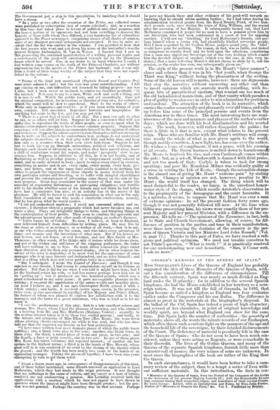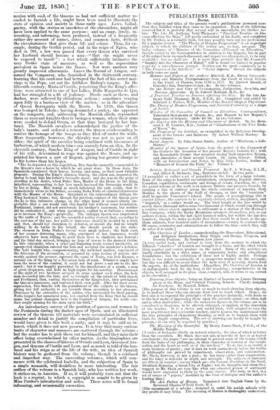GEORGE'S MEMOIRS OF THE QUEENS OP SPAIN. * Mrss STRICKLAND'S Lives
of the Queens of England has probably suggested the idea of these Memoirs of the Queens of Spain, with- out a due consideration of the difference of circumstances. Till the fifteenth century, Spain was nearly as much divided as
land under the Heptarchy ; for in addition to the several Sp
kingdoms, she had the Moors established in her territory as a sove- reign nation. It was not till the fall of Granada, in 1492, that Spain became as -united a kingdom as England was four centuries earlier under the Conqueror and his son Rufus. The difference is almost as great in the materials at the biographer's disposal. In the ballad of the Cid, Spain has indeed a poem of high character and several of her chronicles, in point of original knowledge and worldly spirit, are beyond what England can show for the same time. But Spain lacks the number of authorities—the quantityof materials • above all, she wants the minute records of our Eichequer, which often throw such a curious light on the manners of the age and the household life of the sovereigns, by their detailed disbursements of the Court. The deficiency of material is peculiarly-felt in the case of the Queens of Spain ; who do not seem to have been much con- sidered, unless they were acting as Regents, or were remarkable to their discredit. The lives of the Gothic Queens, and many of the Queens of the separate Spanish kingdoms, furnish little more than a muster-roll of names; the very names of some are unknown. In most cases the biographies of the book are rather of the King than the Queen.
In such circumstances, it would have been better to take a sum- mary review of the subject, than to a tempt a series of lives with- out sufficient materials. In this introduction, the facts in con-
• Memoirs of the Queens of Spain, from the Period of the Conquest of the Goths to the Accession of her present Majesty Isabella II.; with the Remarkable Events that occurred during their respective reigns, and Anecdotes of their several Courts. By Anita George. Edited, with an Introduction and Notes, by Hiss Julia Pardee. Author of " Memoirs of Francis the First," the. Vol. I. Published by Bentley.
flexion with such of the Queens as had not sufficient matter re- corded to furnish a life, might have been used to illustrate the state of opinion and society in those early ages. Laws, ballad- poetry, with the stories or anecdotes of the chroniclers, might all have been applied to the same purpose ; and an essay, lively, in- teresn., and hrtbrming, been produced, instead of a frequently rather d y account of names, dates and common facts, without the circumstances that give them life and colour. Thus, for ex- le, during the Gothic period, and in the reign of Egica, who
in 701, a law was passed that every Queen who survived _her husband should become a nun—" that she might never be exposed to insult " : a fact which sufficiently intimates the very Gothic state of manners, as well as the superstition prevalent in Spain before the Moors. Nor were matters very greatly improved afterwards. James the Second of Aragon, stir- nago the Conqueror, who flourished in the thirteenth century, learning that his confessor had betrayed the fact of his secret mar- riage to the Pope, cut out the faithless Bishop's tongue. In the fifteenth century, Maria of Castile, pereeivingthat the Ring's affec- tions were attracted to one of her Lilies, Dona Margarita de Ijar, had her strangled in'a fit of jealousy. Deeds such as these, and darker, were relieved by chivalrous actions ; sometimes verging upon folly in a business view of the matter,—as in the adventure of Queen Berenpria with the Moors. In 1139, this Queen was besieged in Toledo ; having demanded a parley, she appeared on the ramparts, and, addressing the Moorish chiefs, reproached them as recreant knights thus to besiege a woman, when their arias were needed to defend Oran, at that time besieged by her hus- band. The Moorish cavaliers acknowledged the justice of the lady's taunts, and ordered a retreat; the Queen condeseendin,, to reeeive the homage of the troops as they filed off under the walls. More frequently, however, the chivalry was not so pure on all sides - the spirit of the cavalier being combined with basenesses of barbarism, of which modern times can scarcely form an idea. In the eleventh century, Sancho Rung of Aragon, and of Castile in right of his wife, determined to wage war against the Moors, and ap- pointed his Queen a sort of Regent, giving her greater charge as ta his horses than his lieges. "Ere he departed on this expedition, Don Sancho earnestly commended to the Queen's care a horse by which he set great store. In those days, the Spaniards considered their horses, hawks, and arms, as their most valuable cpenerty. During the King's absence, Garcia, the eldest son, requested the to lend him his father's favourite steed; and she was on the point of acceding to his desire, when Pedro Sese, Master of the Horse to the King, interfered, representing to her how much incensed the Sovereign would be by her so doing. Her denial so much infuriated the rash youth, that he immediately wrote to his father, accusing Dam Nona of criminal intereoiie with the Master of the Horse. Surprised at the extraordinary tidings, the King hastened home; but, though the previous conduct of the Queen gave the lie to this infamous charge, on the other hand it seemed utterly im- F°bale that a son would cam this fearful tale without some faun non. erdinand, indeed, did not corroborate his bather's statement, but neither did he contradict it ; and when questioned, replied in so dubious a manner as to increase the King's perplexity. The unhappy Queen was imprisoned in the castle of Najera ; and the assembled nobles decreed that, according to the customs of the age, her guilt or innocence should be decided by a duel, and that, should her champion be defeated, or should she find no knight willing to do battle in her behalf, she should perish at the stake. The chances in Don's NoOn's favour were small indeed ; the high rank of her accuser deterring many, who, convinced of her innocence, would otherwise have been willing to peril their lives to vindicate her honour; and the fatal day arrived, bringing no hope of rescue to the doomed victim In this extremity, when a cruel and lingering death seemed inevitable, an unexpected champion entered the lists end accepted the slanderer's defiance.
• Thd knight who, compassierrating the wretched mother, convinced of the falseness of the accusation, or actuated by seine feeling of private aui- mosity against the accuser, espoused the cause of Nufia, was Don Ramiro, a natural sou of the King by a Navanese lady of rank. Whatever Meht have been the issue of the combat, it could not but prove a sad one to the Mo- narch ; but it was happily prevented by the interference of a monk, it man of great eloquence, and held in high repute for his sanctity. Horrorstruck at the sight of two brothers arrayed in arms against each other, the holy man descended into the lists, and so wrought on the minds of both Garcia and Ferdinand, that, casting themselves at the King's feet, they proclaimed the Queen's innocence, and confessed their own guilt. After the most severe reproaches, Don Sancho left the punishment of the culprits to the Queen, giving her full authority to act towards them according to her pleasure. Overcome by the entreaties of the nobles, who interceded for their pardon, Nufies forgave her unnatural eons, but exacted from the King that he should name her gallant champion heir to the Condado of Aragon, his noble con- duct amply atoning for the stain upon his birth."
An introductory survey of the position of queens and women in the Peninsula daring the darker ages of Spain, and an illustrated review of the Queens till materials were accumulated in sufficient number and detail. to justify the compilation of particular lives, would have given to this book a. unity, and it may be said an in- terest, which it does not now possess. It is true that many curious traits of character and manners are scattered through the volume ; but the reader has to pick them out for himself, and they miss their effect being overwhelmed by other matter. As the biographies are presented in the classes ofQneens of Oviedo andLeon, Queens of Ara- gon, and Qneens of Castile and Leon, and as much is told of the hus- band and his reign as of the life of the wife, an idea of Spanish history may be gathered from the volume, though in a confused and imperfect way. The succeeding volumes, which will com- mence with the celebrated Isabella, and the subjection of Spain to a single monarch, will doubtless be more interesting. The fair author of the volume is a Spanish lady, who has written her work, it strikes us, in America. If so, it will probably turn out that the book is a reprint, to which a copyright is sought to be given by Miss Pardoe's introduction and notes. These notes will be found infoioning, and oecasionally corrective.
:III I • 1



























 Previous page
Previous page